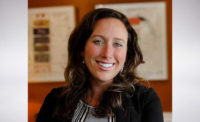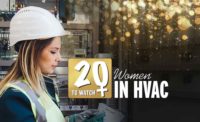Name/Title/Company: Rina Vidri, senior mechanical group manager, Primera Engineers
Age: 56
Educational Experience: Bachelor’s degree in mechanical engineering, Riga Technical University
Professional Credentials/Accreditations: Professional engineer (P.E.), Leadership in Energy and Environmental Design Accredited Professional (LEED AP)
Organizational Affiliations/Achievements/Awards: ASHRAE local chapter member
What does your day-to-day job entail?
As Primera’s senior mechanical group manager, I manage several intensely technical projects. I ensure my team provides high-quality solutions while meeting project deadlines and staying under budget. Simultaneously, I lead the HVAC design process for all of Primera’s mechanical projects. My day-to-day activities include mentoring and providing guidance to junior engineers, managing design workload, overseeing project budgets, and ensuring that all projects remain on track to meet delivery deadlines. Depending on project phases, some of the deliverables can include HVAC system selection, layout, calculation, coordination, task assignments, site visits, construction coordination, and more.
What caused you to/when did you fall in love with engineering?
Throughout my childhood, I expressed a love for science and especially math-related subjects. As a student, I competed in various math, physics, and chemistry competitions and participated in STEM focused extracurricular activities. Given my early passion for these topics, engineering was a predictable path for my future profession.
What has been the most rewarding/proudest aspect of your engineering career?
What I really enjoy about my career is seeing a building start with just a few sketches, and, through collaboration with architects, designers, and planners, turn into a beautiful space that people can use and enjoy. Oftentimes, I drive by some of the projects I’ve worked on, like apartment complexes, university campus buildings, and offices, and feel like I’ve made an impact on the community I live in.
What challenges do women face in this profession? Can you give a personal example? Why aren’t there more women in engineering? How can we increase the number of women in engineering?
At the start of my career, there were almost no women in the industry. Currently, more women are choosing to pursue engineering, which I love to see; however, the HVAC and mechanical fields still only see a handful of women in comparison to other specialties. Not seeing many women in the field was a challenge for me early on, but it also provided more motivation to keep going. Nowadays, women in the industry are becoming more respected and more supported, which I think is encouraging more of them to join STEM-focused careers. In my opinion, I also think it’s crucial for young women to understand that a healthy balance between being a successful engineer and having a family exists. We need to highlight and promote the fact that women don’t have to choose between their careers or their families, and the two can coexist for a fulfilling life.
How many years have you been active in the engineering sector? What’s changed the most in that time? What’s changed the least?
I’ve spent 32 years now in the engineering sector. In 1990, I came to the U.S. after obtaining my degree from Rigas Polytechnical Institute (currently Latvia Technical University) and started at a small firm in Michigan. My education experience was not much different from young engineers today. However, the biggest change I’ve seen is the modernization of calculation software. CAD and Revit programs have become much more sophisticated, allowing us to utilize the software and design projects in new ways. I’ve also noticed that the industry, in general, and owners, specifically, have become more energy conscious when selecting HVAC systems for their projects.
You served as a lead mechanical engineer for the David M. Rubenstein Forum, a 90,000-square-foot high rise building at the University of Chicago. I understand this project was “award-winning.” Can you share your role, what awards the project received, and some of the design challenges you encountered?
For the University of Chicago’s David M. Rubenstein Forum project, I was the lead mechanical engineer, involved in the design process from the early programming phase through the end of construction. This project has won several engineering design awards as well as architectural awards. Engineering design awards include the 2022 American Council of Engineering Companies of Illinois (ACEC-IL) Engineering Excellence Merit Award, the 2022 Illuminating Engineering Society (IES) Merit Award, the 2022 International Association of Lighting Designers (IALD) Award of Merit, the Best Tall Building Worldwide 2022 Council on Tall Buildings and Urban Habitat (CTBUH) Award Winner, and the 2021 ASHRAE-Illinois Technology Award. The building is also certified as LEED Gold. Some of the engineering design challenges for the facility were based on the unique geometry of the building, the varying HVAC systems, and the tight energy parameters that needed to be met.
You pushed for, and are leading, an all-women-led design team for a new Illinois State Police crime lab facility. Why is this so important to you?
The all-women’s team for the Illinois State Police facility was put together by RADA Architects in collaboration with all women owned/led companies. The lead for each of the disciplines are women, which is an extremely unique opportunity. I am excited to lead the HVAC design on this project and think it’s important for the visibility it provides in support of women’s leadership and empowerment. I am hoping this will also encourage enhanced collaboration and improve fairness for women across the industry.
What drives/motivates you every day?
I love what I’m doing. To me, this field is anything but boring. I consider HVAC to be a scientific art with no two projects being exactly alike. This industry is also constantly changing due to new technologies and innovations. I love to learn, challenge myself, and face new issues so that I can come up with creative solutions. Dealing with new tasks every day is what keeps me motivated.
What remains on your engineering bucket list — what do you aspire to do that you haven’t accomplished yet?
Giving back to the profession that has given me so much fulfillment is at the top of my engineering bucket list. I believe that mentoring is as important as ever for the sake of the industry’s future. I would love to try to continue spreading my knowledge and help others advance their careers, not just at my current firm but across the industry as well. I would also like to publish and/or present on HVAC trends at high profile industry events. Lastly, I would like to continue progressing on my current career path and eventually land in an executive management position.
What’s one thing no one knows about you?
I’m an open book, so there’s not much that people don’t know about me. I do enjoy traveling, so an interesting fact about me is that I have been to 36 countries and have been fortunate enough to visit nearly all continents, including Africa; Europe; North, South, and Central America; and Asia. I am looking forward to many more adventures!
List any mentors who’ve helped you succeed and describe precisely how they’ve shaped your success.
In my first decade of working as an engineer, Ralph Climie, a senior mechanical project engineer, played a significant mentoring role for me. He not only shared his technical knowledge and expertise with me, but he was also very good about teaching me soft skills as well. For example, he always provided the best advice on handling stressful situations or difficult clients. He stressed the importance of building relationships and continuously pushed me to jump out of my comfort zone and challenge myself.
What advice do you have for prospective female engineers considering entering the field?
While still in college, apply for internships. It will give you opportunities to explore the many facets of the industry and help you build confidence. I would also say to strive to find balance in your life, especially when it comes to your career and your family. Lastly, don’t be afraid to challenge yourself, as it will only lead to personal growth. Even if the challenge seems overwhelming, taking smaller more controlled steps will also lead to success.





